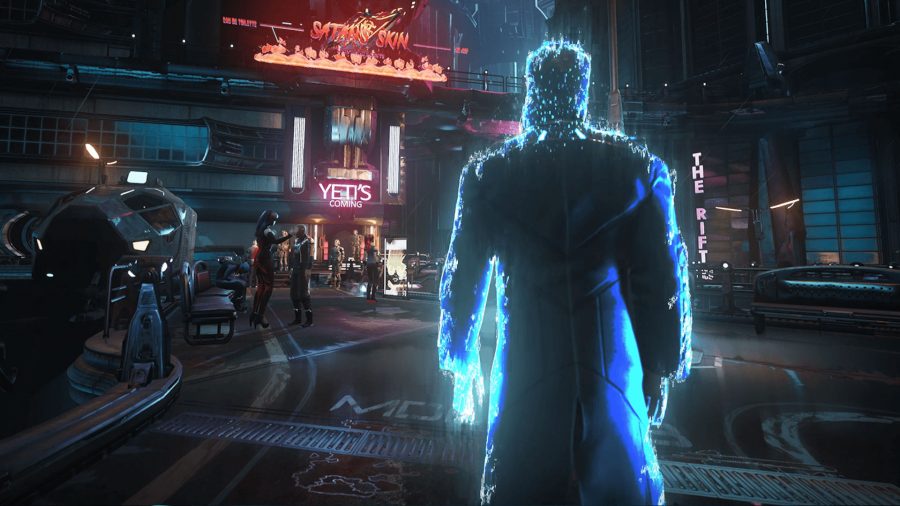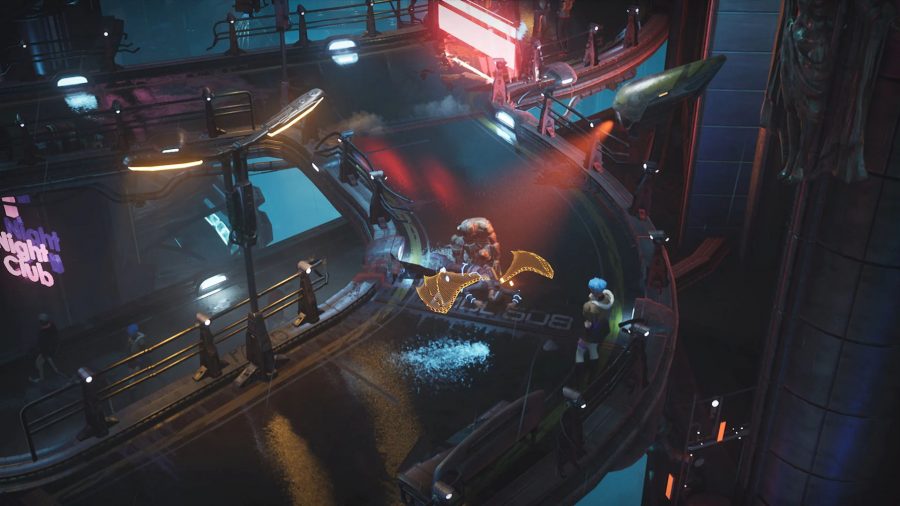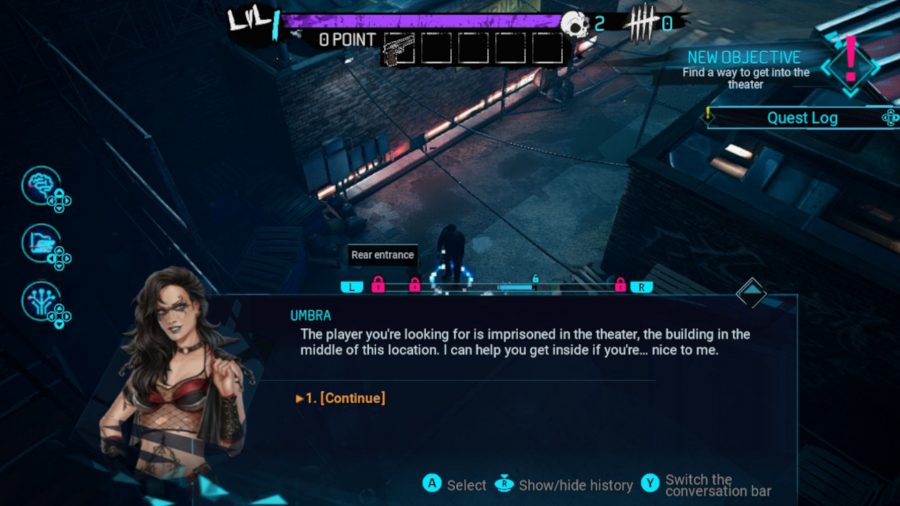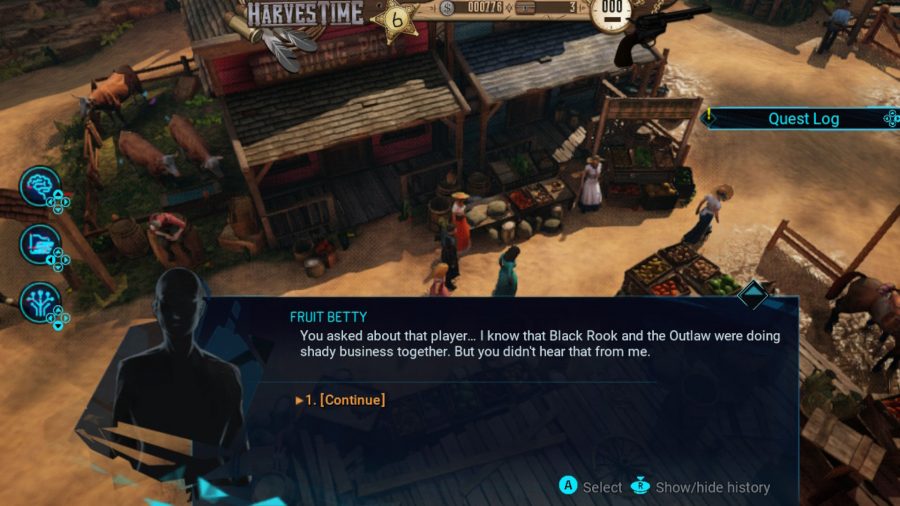Video games and satire have an age-old relationship. From Conker’s Bad Fur Day, Rare’s takedown of the 3D platformer boom of the 1990s, to the mammoth GTA saga and its all-encompassing cultural castration. Still, rarely do they come as articulate and scathing as Gamedec, a wide-reaching satirical take on the possible future of gaming in virtual reality, neatly disguised as a deduction-based point-and-click mystery.
In the world of Anshar Studio’s latest title, you lead the life of a game detective, who specialises in solving crimes committed in the various virtual realities for a good chunk of change. Of course, there’s dark discoveries lingering beneath the surface that end up driving the core narrative, but your fall into the terrifying truths that await is cushioned by an exposition-laden first couple of cases.
Before getting into the meat of the deduction-orientated gameplay, I have to take a minute to highlight the carefully crafted worldbuilding throughout the in-game environments. Split between the realms of Realium, the real world, and Virtualium, the virtual equivalent, there’s a real sense of a social structure, cultural behaviours, and a foreboding feeling of grit that runs deep in the veins throughout it all. The world of Gamedec is edgy with a big E, like a cyberpunk Tarantino murder mystery, aimed squarely at mature audiences.
The cases you have to crack as you cascade into the multiple conspiracies of Gamedec are equally macabre, covering blackmail, child trafficking, murder, and more within just the first few hours of playtime. Each overarching case is split into four different sections of deductions, starting from a preliminary investigation and ending up in a verdict that will change the path ahead of you, whether it’s right or wrong.

Your primary method of collecting information for crime-solving is by interacting with NPCs, and the information you collect is based on what professions you have as a game detective. These jobs range from scalpel, offering medical knowledge useful in questioning, to sensory celebrity, where you can fool others into thinking you have social influence, and with 16 in total, there’s more than enough options for prying potential criminals.
Things do get a little convoluted at points, and the amount of menus doesn’t perfectly suit Switch hardware, as with so many options and notifications it can be a little too easy to make a mistake or waste a little time messing around on the wrong screen. It doesn’t help that each piece of information on a character, even if not necessarily related to the case, gives you a needless notification.
That isn’t to say that it’s always a chore going around chasing and retaining information, but it could be simplified a little to make the experience more fluid and easier to follow, especially with the number of mid-mission objectives that come and go a little too often for my liking. Sometimes when you’re trying to solve a case and you feel like you’re onto something, these small excursions come across as unnecessary, even if they can contribute to a better-informed solution.

Gamedec doesn’t treat you like an idiot, though, and it’s easy to make mistakes in the early game if you don’t check out the tutorials properly. There’s enough context in each case to lead to various outcomes, and only if you get collect enough information will you figure out the truth, something I didn’t realise before I plummed for my first verdict and fell flat on my face. Fortunately, I’m a control freak and for reasons I’ll get into later had a backup save, but the learning curve was appreciated nonetheless.
So the world is deep, managing to stand out in a saturated time for cyberpunks, and the gameplay is nuanced, if not a little over-the-top, but what of the characters? Sadly, they don’t quite match up. I should be specific here and say that it isn’t exactly depth that the characters lack, but charisma. The roster of NPCs varies from relatively irritating to downright gross, and the fact the first game world you dip into is a BDSM-themed debauchery-fest full of delinquents certainly doesn’t help the cause.
This lack of charisma extends into the protagonist too, and the Gamedec themself is at points difficult to relate to, even with all the possible in-game character creation options. It’s all just so dark. This is probably all in aid of the cynical, openly satirical commentary on video game addiction, social issues in the game industry, and consumer culture as a whole, but sometimes it does feel like it could do with a little heart from the main man just to make him more relatable, rather than occasionally fading into the sea of vaguely unlikeable characters.

What I will say, is that despite the characters feeling a little one-dimensional in their wants, needs, and personalities, the dialogue that is pertinent to investigations is well written and achieves its purpose. Classic whodunnit tropes are out in force, but they’re much more tasteful than the characters who indeed dunnit, and there’s enough difficulty in the deduction to take a sense of pride from each correctly solved case.
When it comes to how Gamedec runs on Switch, unfortunately, I did experience a couple of performance issues during my time in Realium and the various game worlds. For the most part, these were limited to the occasional stutter, but on at least one occasion I found myself trapped behind an NPC in the corner of the room, unable to move past them and with a frustrating eighteen minutes between that point and my last save.

Still, that one single game-breaker didn’t tarnish the experience so much as to put me off Gamedec, nor did the occasional control issues that made my poor protagonist run around in actual circles rather than the metaphorical ones I should have been concentrating on. They did make me a little more aware of the spaces I visited though, with indoor areas particularly tough on the controls, which meant I spend a good bit more time backing up my save file than I would have liked.
All-in-all, this is a game with a lot to say, and a lot to do, flirting with excessive terminology, menus, and characters. Despite this, the core detective element is finely tuned, and anyone who enjoyed the grey morality of Disco Elysium, the pervasive snide of classic GTA, or the heavy meta of The Stanley Parable, will feel right at home diving into the erroneous underbelly of Gamedec.














